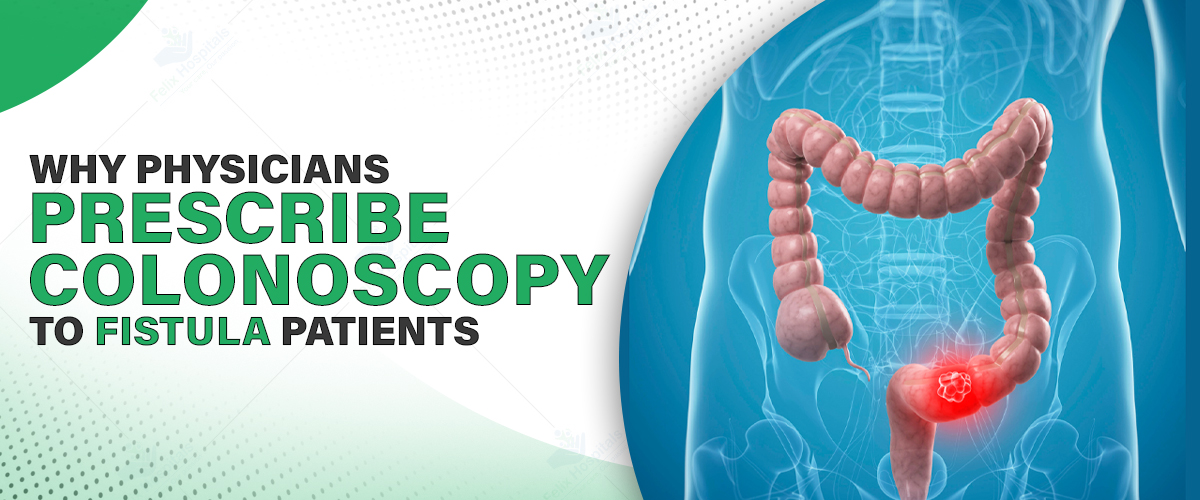
Subscribe to our

Anal and intestinal fistulas are abnormal tracts that form between two organs within the body or between an internal organ and the skin. These painful, persistent tracts can result in infection, drainage, and lifelong consequences if not diagnosed or treated. Although MRI and CT scanning are key in visualizing fistulas, colonoscopy continues to be essential in determining causes, establishing specific treatments, and enhancing patient outcomes.
Let’s explore why colonoscopy is frequently recommended for fistula patients and how it enhances the diagnostic and therapeutic process.
Ask your care team about scheduling a colonoscopy before imaging or surgery. Call us today at +91 9667064100.
The following ten factors support the doctor’s recommendation of colonoscopy for fistula surgery:
A good many fistulas are associated with underlying conditions such as Crohn's disease or ulcerative colitis, both inflammatory bowel diseases (IBD). External imaging may demonstrate the tract of a fistula, but colonoscopy enables physicians to directly view inflammation, ulcers, or mucosal abnormalities that establish a diagnosis of IBD.
Colonoscopy gives a complete view of large bowel, extending from the rectum to the cecum. This complete, real-time visualization helps in finding:
internal fistula openings
infections
structural abnormalities like scar tissue
polyps or precancerous signs
With the assistance of the best laparoscopic surgeon in Noida, polyps can be removed simultaneously, providing immediate preventative treatment against colorectal cancer.
What is found on colonoscopy has direct implications for the treatment of your fistula:
Straightforward fistulas: May be treated with local surgery like fistulotomy or seton insertion.
Complex or Crohn's fistulas: Typically require a multidisciplinary approach, utilizing a combination of biologic medications and surgery.
Suspicious findings, like polyps or lesions: Can involve further coordination with an oncologist or gastroenterologist.
This sensitivity ensures that each patient receives the right treatment at the right time, without inappropriate intervention.
Colonoscopy has also been demonstrated to enhance long-term results for fistula patients. A colonoscopy detects additional inflammation that is not visible on an external image. Treatment of these findings at the best laparoscopic surgery hospital in Noida can promote healing and lower the risk of recurrence of disease.
Fistulas can be associated with, or hide, severe conditions like colorectal cancer. Colonoscopy is the most effective method for early detection. Direct visualization and removal of precancerous lesions, like adenomatous polyps, are possible.
This type of examination is especially valuable in patients with chronic inflammation or rectal bleeding, where occult malignancy can otherwise be overlooked.
Colonoscopy findings frequently are the basis for a coordinated treatment plan among surgeons, gastroenterologists, and oncologists. In the case of complicated disease, this degree of coordination will ensure that every facet—ranging from controlling inflammation to operating timing—is managed in a smooth and patient-focused manner.
Done in mild sedation, colonoscopy is a safe, outpatient procedure with a rich harvest of diagnostic information. The process is more comfortable than anticipated in most patients, particularly when well-prepared.
The advantages of such a high-yield procedure—detection of disease, cancer prevention, and improved operative planning—far exceed the temporary inconvenience of bowel preparation.
Patients who are preparing for fistula repair can achieve bowel cleansing as part of their pre-operative routine. Colonoscopy aligns well with the process and allows providers to assess the bowel's readiness for repair. With instructions on the use of soothing creams, bidets, or soft wipes, discomfort during preparation can be reduced—making it more bearable even for patients with active fistulas.
Omitting colonoscopy prior to fistula surgery can lead to overlooked diagnoses or unsuccessful treatments. Surgeons might go ahead and operate without understanding the degree of internal inflammation or the presence of polyps or masses. Colonoscopy provides a detailed internal map—assisting in avoiding failed repairs or multiple operations.
For IBD or recurrent fistula patients, colonoscopy is not a standalone appointment—it's a part of ongoing monitoring of disease. Regular follow-ups allow evaluation of disease activity, assessment of drug efficacy, and identification of changes in the lining of the intestine that can predict future problems.
Schedule your colonoscopy today and take a proactive step toward full healing.
Colonoscopy is more than a cursory test for fistula patients—it's a thorough, diagnostic, and preventive procedure that enhances the outcome of surgery, individualizes care, and minimizes the risk of severe complications such as cancer or repeated surgery. When synchronized with the proper team of medical professionals, colonoscopy becomes a cornerstone of safe and effective fistula management.
From identifying hidden diseases to guiding complex treatment decisions, colonoscopy plays a central role in delivering the best possible care.
Q1. Is a colonoscopy necessary if an MRI already shows the fistula?
Ans: Yes. MRI maps the fistula tract, but colonoscopy can detect inflammation, ulcers, or polyps—critical details that an MRI cannot reveal.
Q2. Can colonoscopy worsen my fistula?
Ans: It's extremely uncommon. Done with caution under sedation, colonoscopy is safe. The majority of patients accept it well if they are well-prepared.
Q3. What happens if colonoscopy identifies Crohn's disease?
Ans: You could be placed on specific treatments such as biologic medications to manage inflammation prior to or following surgery—minimizing healing time and recurrence.
Q4. Will an oncologist be part of my treatment?
Ans: Only in the event that colonoscopy detects polyps or lesions that need follow-up evaluation. This facilitates early detection of cancer and planned intervention, if needed.
Q5. How much does a colonoscopy cost?
Ans: Although it does incur an added expense to overall care, early disease detection and prevention of repeated surgeries usually makes colonoscopy a cost-saving measure.
Q6. How often should I repeat colonoscopy if I have IBD?
Ans: For Crohn's or ulcerative colitis patients, repeat colonoscopies every 1–3 years as indicated, depending on disease severity and history.
Q7. Are there no-sedation colonoscopy options?
Ans: Yes, but the majority of patients like to have mild sedation for comfort. It relaxes the anxiety and enhances the quality and success of the procedure.